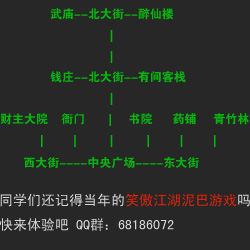我贴一些在mudos的changlog里面找到的东西,作为补充说明。
Fri Oct 6 18:58:01 EDT 1995 (tim@handel.princeton.edu (Beek))
* bumped version number to v21.6
* LPC->C support:
. annonymous functions, function pointers,
* compiler changes:
. warning for (: string constant :)
Sat Jan 21 20:25:44 EST 1995 (tim@handel.princeton.edu (Beek))
* raised patchlevel to v20.26
* added support for pass-by-value to function pointers. The
syntax is $(expression), where "expression" will be run when
the function pointer is made, not when it is evaluated.
Note the difference between (: this_object() :) and
(: $(this_object()) :)
* added anonymous functions. The syntax is:
function( <argument list> ) { <code> }
for example:
create() {
function f;
f = function(int x) {
int i;
for (i = 0; i < x; i++) { write(i+""); }
};
evaluate(f, 10);
}
Thu Nov 10 09:08:26 EST 1994 (tim@handel.princeton.edu (Beek))
* raised patchlevel to v20.18
* removed the entry in the Bugs file for f=(: ob, ({ func, a, b }) :)
since NEW_FUNCTIONS fixes this already
Sat Sep 24 16:51:06 EDT 1994 (tim@handel.princeton.edu (Beek))
* raised patchlevel to v20.10
* made nesting of (: $var :) functionals work correctly
* Added support for the second to last version of function
pointers; "(: expression :)". Arguments to the function
are represented as $1, $2, $3 ...
For example:
sort_array(arr, (: sizeof($1) < sizeof($2) :) );
Mon Aug 29 17:47:41 EDT 1994 (tim@handel.princeton.edu (Beek))
* raised patchlevel to v20.1
* efun, lfun, and simul_efun pointers are now available.
Examples:
function f = (: previous_object, -1 :);
int foo() { }
...
function f = (: foo :);
* arguments can be passed either by including them in the
definition:
function f = (: write_file, "/log/fp", "evaluated.\n" :)
or when evaluated:
function f = (: explode :);
result = (*f)("this is a test", " ");
Fri Oct 6 18:58:01 EDT 1995 (tim@handel.princeton.edu (Beek))
* bumped version number to v21.6
* LPC->C support:
. annonymous functions, function pointers,
* compiler changes:
. warning for (: string constant :)
Sat Jan 21 20:25:44 EST 1995 (tim@handel.princeton.edu (Beek))
* raised patchlevel to v20.26
* added support for pass-by-value to function pointers. The
syntax is $(expression), where "expression" will be run when
the function pointer is made, not when it is evaluated.
Note the difference between (: this_object() :) and
(: $(this_object()) :)
* added anonymous functions. The syntax is:
function( <argument list> ) { <code> }
for example:
create() {
function f;
f = function(int x) {
int i;
for (i = 0; i < x; i++) { write(i+""); }
};
evaluate(f, 10);
}
Thu Nov 10 09:08:26 EST 1994 (tim@handel.princeton.edu (Beek))
* raised patchlevel to v20.18
* removed the entry in the Bugs file for f=(: ob, ({ func, a, b }) :)
since NEW_FUNCTIONS fixes this already
Sat Sep 24 16:51:06 EDT 1994 (tim@handel.princeton.edu (Beek))
* raised patchlevel to v20.10
* made nesting of (: $var :) functionals work correctly
* Added support for the second to last version of function
pointers; "(: expression :)". Arguments to the function
are represented as $1, $2, $3 ...
For example:
sort_array(arr, (: sizeof($1) < sizeof($2) :) );
Mon Aug 29 17:47:41 EDT 1994 (tim@handel.princeton.edu (Beek))
* raised patchlevel to v20.1
* efun, lfun, and simul_efun pointers are now available.
Examples:
function f = (: previous_object, -1 :);
int foo() { }
...
function f = (: foo :);
* arguments can be passed either by including them in the
definition:
function f = (: write_file, "/log/fp", "evaluated.\n" :)
or when evaluated:
function f = (: explode :);
result = (*f)("this is a test", " ");

